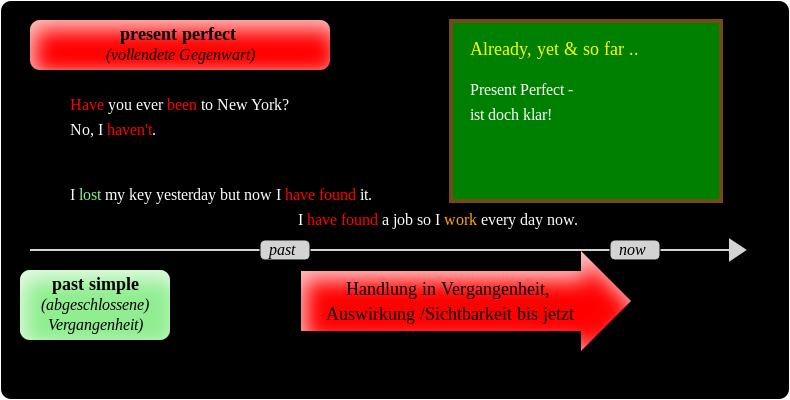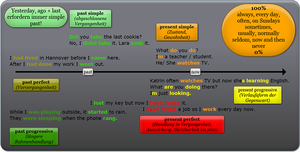Present Perfect/Kontrastierung: Unterschied zwischen den Versionen
(+ Vorlage) Markierung: Quelltext-Bearbeitung 2017 |
Markierung: Quelltext-Bearbeitung 2017 |
||
| Zeile 20: | Zeile 20: | ||
Manager: "''Did you call (you, call)'' us <span style="color:#390">a day before</span>?" | Manager: "''Did you call (you, call)'' us <span style="color:#390">a day before</span>?" | ||
Mr Boyd: "Yes, we ''phoned ( | Mr Boyd: "Yes, we ''phoned (phone)'' <span style="color:#390">in the afternoon</span>." | ||
Manager: "The money ''hasn't come (not, come)'' from the main bank <span style="color:red">yet</span>." | Manager: "The money ''hasn't come (not, come)'' from the main bank <span style="color:red">yet</span>." | ||
Version vom 24. November 2020, 14:32 Uhr
Anders als im Deutschen ist Present Perfect nicht mit der einfachen Vergangenheit (Past Simple) austauschbar. Mit Hilfe der Signalwörter muss man entscheiden, ob eine Handlung abgeschlossen ist oder Auswirkungen auf die Gegenwart hat.
Interactive Exercises
Present Perfect or Simple Past?
Look at the signal words and fill in the correct forms!
Ms Boyd and her husband are in the bank. They are talking to the bank manager.
Manager: "Good morning. Can I help you?"
Ms Boyd: "Yes, we booked (book) a holiday in Canada three months ago and picked up (pick up) the tickets from the travel agent a week later. But we haven't got (not get) any Canadian money yet."
Manager: "Have you already decided (you, already, decide) how much you need?"
Ms Boyd: "We talked (talk) about that yesterday and we need 5,000 Canadian $."
Manager: "Did you call (you, call) us a day before?"
Mr Boyd: "Yes, we phoned (phone) in the afternoon." Manager: "The money hasn't come (not, come) from the main bank yet."
Ms Boyd: "That's not good."
Manager: "Wait a minute. I checked (check) the money an hour ago but perhaps it has come (come) since then."
Manager: "A man has just brought (just, bring) the money from the main bank. lt is here."
Mr Boyd: "We haven't asked (not, ask) yet how much a Canadian dollar is."
Manager: "I checked (check) yesterday and 5,000 dollars were (be) 750 pounds. But I haven't looked (not, look) today yet. Though I think it's the same."
Mr Boyd: "That's OK. Thank you."
Manager: "Good morning. Can I help you?"
Ms Boyd: "Yes, we booked (book) a holiday in Canada three months ago and picked up (pick up) the tickets from the travel agent a week later. But we haven't got (not get) any Canadian money yet."
Manager: "Have you already decided (you, already, decide) how much you need?"
Ms Boyd: "We talked (talk) about that yesterday and we need 5,000 Canadian $."
Manager: "Did you call (you, call) us a day before?"
Mr Boyd: "Yes, we phoned (phoned) in the afternoon." Manager: "The money hasn't come (not, come) from the main bank yet."
Ms Boyd: "That's not good."
Manager: "Wait a minute. I checked (check) the money an hour ago but perhaps it has come (come) since then."
Manager: "A man has just brought (just, bring) the money from the main bank. lt is here."
Mr Boyd: "We haven't asked (not, ask) yet how much a Canadian dollar is."
Manager: "I checked (check) yesterday and 5,000 dollars were (be) 750 pounds. But I haven't looked (not, look) today yet. Though I think it's the same."
Mr Boyd: "That's OK. Thank you."
Present Perfect - ist doch klar!
- Interactive Exercises 1 (regelmäßige Formen)
- Exercises 2 (unregelmäßige Formen)
- Kontrastierung (Gegenüberstellung) von Present Perfect und Simple Past
- How long …? - since & for (regelmäßige Formen)
- Present Perfect Progressive
Past Tense:
Present Tense:





